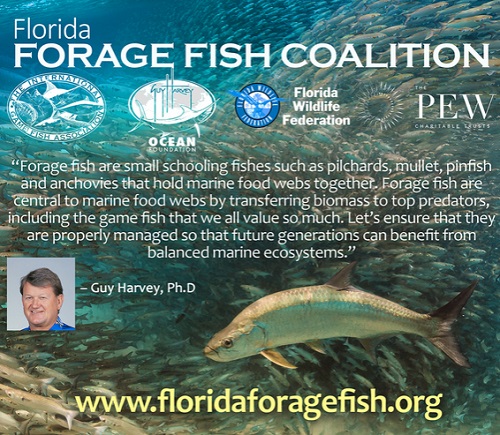 Forage fish are small to medium-sized, schooling species (eg., anchovies, pinfish, herring, scad, menhaden, mullet, and sardines) that play a critical role in marine ecosystems by transferring energy up to larger fish, marine mammals, and birds who prey on them. Forage fish also account for a third of global marine catches and are processed as feed for fish farms, livestock, as well as nutritional supplements. However, forage fish have recently become an increasingly hot topic in the United States after new studies revealed how dependent predators are on forage fish abundance.
Forage fish are small to medium-sized, schooling species (eg., anchovies, pinfish, herring, scad, menhaden, mullet, and sardines) that play a critical role in marine ecosystems by transferring energy up to larger fish, marine mammals, and birds who prey on them. Forage fish also account for a third of global marine catches and are processed as feed for fish farms, livestock, as well as nutritional supplements. However, forage fish have recently become an increasingly hot topic in the United States after new studies revealed how dependent predators are on forage fish abundance.

Forage fish experience natural fluctuations in abundance and because they also school together in high densities, they are easily targeted by commercial vessels which, together, can compound any declines in their abundance. In 2012, The Lenfest Ocean Program published a study that documented that in a variety of marine ecosystems, there are a large percentage of predators whose diets depend greatly on forage fish abundance. As such, when forage fish abundance declines, there are also concomitant declines in predator abundance. The study also compared the global value of the direct catch for forage fish with the value of allowing them to remain in the ocean as prey for other valuable fish. What was found was that the direct value of commercial forage catch equaled $5.6 billion USD and their supportive value was much higher, totaling $11.3 billion USD.
With this new information on the importance of forage fish to marine predators, it is imperative that we manage them so that there enough left in the ocean to fulfill the dietary needs of recreationally and commercially important species. Currently, IGFA is partnering with the Guy Harvey Ocean Foundation, Florida Wildlife Federation, and Pew Charitable Trusts in an effort to work with the Florida Fish and Wildlife Conservation Commission (FWC) to find constructive means of improving forage fish data collection and management in Florida. With more than 2,000 miles of shoreline and 11,000 miles of waterways, Florida has the largest economic impact from recreational fishing than any other state. With over three million anglers generating over $5 billion USD in retail sales, it’s easy to see why people call Florida the Fishing Capital of the World. Florida’s economy and healthy marine environment rely on forage fish abundance and therefore, the need for proactive management is vital.
Currently, there are only a few rules that limit commercial catch of forage fish and those in effect do not necessarily incorporate their role as forage for predator species. Further, there are some data gaps that limit our understanding of forage fish abundance and health in Florida. In an effort to proactively bridge these gaps and maintain Florida’s legacy of Fishing Capital of the World, the Florida Forage Fish Coalition seeks to conserve forage fish that serve as a major food source for Florida’s sport fish like snook, tarpon, and redfish as well as commercially important species. Although the FWC does a great job at managing Florida’s recreational and commercial fisheries, with the worldwide demand for forage fish surging, the coalition would like to ensure that the food needs of Florida’s sport fish are accounted for.
Currently, the coalition is educating Florida’s recreational and commercial fishing communities about the new science that exists on forage fish, the importance of forage fish in marine ecosystems, and encouraging these communities to visit www.floridaforagefish.org and take the Forage Fish Pledge to demonstrate that people understand the need for better forage fish management. The coalition is also working with FWC’s senior staff and Commissioners to find constructive ways of improving data collection and improving forage fish management.
Do you live in Florida? Please visit www.floridaforagefish.org and take the Forage Fish Pledge!
